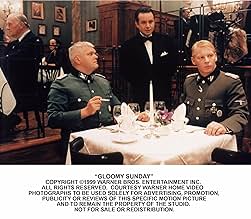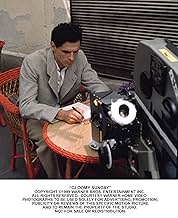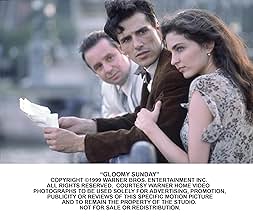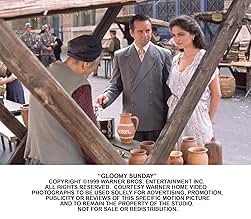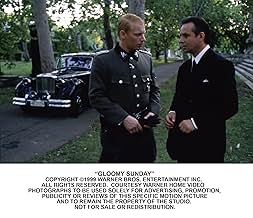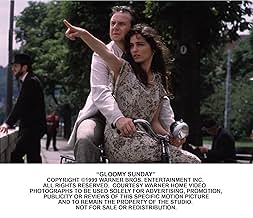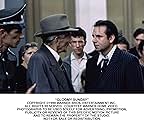Une chanson d'amour et de mort
Original title: Gloomy Sunday - Ein Lied von Liebe und Tod
IMDb RATING
7.8/10
8.7K
YOUR RATING
Follows three men who are in love with a beautiful waitress during World War II: an intellectual restaurant owner, a mysterious musician, and an erratic businessman.Follows three men who are in love with a beautiful waitress during World War II: an intellectual restaurant owner, a mysterious musician, and an erratic businessman.Follows three men who are in love with a beautiful waitress during World War II: an intellectual restaurant owner, a mysterious musician, and an erratic businessman.
- Director
- Writers
- Stars
- Awards
- 7 wins & 5 nominations total
- Director
- Writers
- All cast & crew
- Production, box office & more at IMDbPro
Featured reviews
I wrote this review in December of 2012 when the movie was titled "Gloomy Sunday." A great movie experience. I'm 82 (then) and had been watching movies since I was 18 months old, held in my mother's arms. This is an unforgettable film. Every facet is superb. The acting is flawless, the cinematography is breathtaking, and the gripping story has every human emotion imaginable. It's hypnotic from start to finish, but keep in mind, you have to be attentive. There are some subtle touches that can go unnoticed if you're not carefully observing and listening, and missing them can possibly deprive you of fully understanding and enjoying the fantastic ending. The skilled director doesn't use a heavy hand, and that's admirable. Every single actor gives a perfect performance. Having studied acting for five years, I must mention that they don't act, they behave. Erika Marozsán's portrayal is colossal!. I've fallen in love with her. Even if I were 18 months old now, there's a scene with Joachim Król I'd remember the rest of my life. I've viewed that particular scene about eight times. Gut-wrenching, yet inspirational. Never in my life have a watched any movie four times, and I just saw this one again for the fourth time... in one week! If not for IMDb and Netflix, I would never have heard of it. And it received no nominations for the Academy Awards. Ridiculous! This is truly a masterpiece! I'd never written a review for IMDb before this, but for this film I had to do it. I cannot praise this movie enough!
The late 90s through the early 00s were a breeding ground for urban legends, as we saw in Magnolia (1999), Darwin Awards (2006) and of course the Urban Legends film & TV franchise spanning the decade. Maybe it's due to the fact that the internet, with its viral sensationalism, had just become popular while fact-checking resources had not yet caught up. This made for some very creative storytelling at the expense of truth. But heck, isn't that what storytelling is all about.
Here we have "Gloomy Sunday" (1999) an intriguing story woven around the titular song which, as urban legend has it, caused or accompanied some 20 suicides (exaggerated to "hundreds" in the film). In reality, the song has never been credibly linked to any suicides except that a lot of people in Hungary killed themselves in the 30s when the song was recorded. But I dunno, maybe Hungary's Great Depression had a little more of a role in that statistic?
Enough history. The rest of my review approaches this film as a pure work of fiction, and it's a pretty good one. It's not simply a 2-dimensional message like "sad songs kill people" but it cuts more to the root of what suicide is, the complexity of what motivates it (not just having a sucky life, otherwise a lot more of us would be at the bottom of San Francisco Bay), and how music, art, love and war resonate with the concept of killing oneself.
The story revolves around a love rectangle between the song's composer (a piano player in a restaurant), a waitress, the restaurant owner and a regular diner in the resaurant. But it's no ordinary "jealous lover" type of cliché. Rather, the theme of love, just like the theme of death, is that it is a personal choice that cannot be subjected to society's morals or rules. In other words, the lovers place no conventional expectations on each other (though fury & resentment does play into it). Immediately it strikes you as a love story worth paying attention to.
Next comes the theme of war, particularly World War II and the Nazi persecution of Jewish people. This adds tremendous spice, depth and peril to the situation. It's handled in a subtle yet chilling way that reminds me of the excellent Benigni film around the same time "Life Is Beautiful".
Last but certainly not least is the story's climax and resolution which, itself is worth the price of admission. Let's just say I did not see it coming. And when a film can do that (without being ridiculous) I'm always impressed. I can't imagine anyone who wouldn't be.
The music itself is nice, if you like the song "Gloomy Sunday", but if I were to nitpick, I have to say I didn't like the Heather Nova cover of the song at the closing credits because it featured the "updated" lyrics that were added to the English version in 1936 to make it less depressing (I'm talking about the "dreaming, I was only dreaming" part). I know Billie Holiday popularized that amendment in her famous version, but Billie is allowed to do whatever she damn wants!
Bottom line: great story, great production, great acting & cinematography. But, as with the excellent film "Amadeus", don't expect to study for your musical history exam by watching it. This is creative storytelling at its best.
Here we have "Gloomy Sunday" (1999) an intriguing story woven around the titular song which, as urban legend has it, caused or accompanied some 20 suicides (exaggerated to "hundreds" in the film). In reality, the song has never been credibly linked to any suicides except that a lot of people in Hungary killed themselves in the 30s when the song was recorded. But I dunno, maybe Hungary's Great Depression had a little more of a role in that statistic?
Enough history. The rest of my review approaches this film as a pure work of fiction, and it's a pretty good one. It's not simply a 2-dimensional message like "sad songs kill people" but it cuts more to the root of what suicide is, the complexity of what motivates it (not just having a sucky life, otherwise a lot more of us would be at the bottom of San Francisco Bay), and how music, art, love and war resonate with the concept of killing oneself.
The story revolves around a love rectangle between the song's composer (a piano player in a restaurant), a waitress, the restaurant owner and a regular diner in the resaurant. But it's no ordinary "jealous lover" type of cliché. Rather, the theme of love, just like the theme of death, is that it is a personal choice that cannot be subjected to society's morals or rules. In other words, the lovers place no conventional expectations on each other (though fury & resentment does play into it). Immediately it strikes you as a love story worth paying attention to.
Next comes the theme of war, particularly World War II and the Nazi persecution of Jewish people. This adds tremendous spice, depth and peril to the situation. It's handled in a subtle yet chilling way that reminds me of the excellent Benigni film around the same time "Life Is Beautiful".
Last but certainly not least is the story's climax and resolution which, itself is worth the price of admission. Let's just say I did not see it coming. And when a film can do that (without being ridiculous) I'm always impressed. I can't imagine anyone who wouldn't be.
The music itself is nice, if you like the song "Gloomy Sunday", but if I were to nitpick, I have to say I didn't like the Heather Nova cover of the song at the closing credits because it featured the "updated" lyrics that were added to the English version in 1936 to make it less depressing (I'm talking about the "dreaming, I was only dreaming" part). I know Billie Holiday popularized that amendment in her famous version, but Billie is allowed to do whatever she damn wants!
Bottom line: great story, great production, great acting & cinematography. But, as with the excellent film "Amadeus", don't expect to study for your musical history exam by watching it. This is creative storytelling at its best.
10crisbob
Beautiful Budapest, end of the thirties. Lazlo Szabo a middle-aged jew Hungarian runs a chic restaurant with a beautiful waitress,Ilona who is also his mistress. One day they decide to hire a pianist, and it's Ilona who choose. And it's a good choice because the handsome young man, Andras, creates a wonderful mood on the premises. Little by little he falls desperately in love with Ilona and composes specially for her a song, very melancholic, and a bit misterious. He calls it " Gloomy sunday ". This song brings surprisingly a lot of suicides. The love-triangle functions pretty well until the time a german customer, Hans, who comes regularly in the restaurant falls in love with Ilona, without success.A few years later the german army invades Hungary, Hans is back as a highly placed officer and the jewish condition of Lazlo is going to complicate the lives of the four protagonists. This movie is a master- piece and I'd bet if the film had been produced in Hollywood with Stone, Douglas and Harrison Ford, directed by Cassavetes it would have gained several Oscars. It has all a movie fan can expect from a good film -and more. Beautiful scenery, very good story, marvelous music, talent of the actors, and even a bit of sex. I rarely see a picture twice on the same day. This time I did.
...on why this film is doing well in communities unafraid to see subtitled films. For one thing, the beginning and ending create and resolve a compelling mystery (most of the film is a flashback). For another, you may or may not believe that a song could drive people to suicide, but you must admit it is a beautiful, sad and haunting melody. The story held my interest, as did the characters. The other obvious appeal was the opportunity to gaze endlessly at the incredibly lovely and angelic Erika Marozsán. I am female and straight and I could not get enough of looking at her; I could easily believe that she might inspire a piece of music that conveyed its composer's hopeless longing for her. (And he wasn't so hard to look at himself!) The only thing I couldn't figure out about Mr. Simpson's comments was what the film had to do with New Zealand. Now I know: nothing! :-)
According to the Los Angeles Times review of this film, "The song was actually composed in 1935 by Rezsö Seress, with lyrics by László Jávor, and did in fact accompany a number of suicides as Europe grew darker; Billie Holliday recorded a popular American version." So I guess it's not so far-fetched after all! Who knew?
According to the Los Angeles Times review of this film, "The song was actually composed in 1935 by Rezsö Seress, with lyrics by László Jávor, and did in fact accompany a number of suicides as Europe grew darker; Billie Holliday recorded a popular American version." So I guess it's not so far-fetched after all! Who knew?
"Gloomy Sunday (Ein Lied von Liebe und Tod)" is a very mittel-European take on "Jules et Jim."
It has resonance with "The Pianist," but was produced in 1999 and is only being released in the U.S. now. Based on an urban legend grounded in fact it demonstrates how a piece of music can perfectly capture the zeitgeist of its times, so much so that it influences people's lives to end them. The original facts, with a list of recordings, are documented at www.phespirit.info/gloomysunday/ which is how I knew to find Marianne Faithfull's recording in my collection to play as I write this.
A love quadrangle starts off as an open, free-spirited affair between a jovial restaurant owner and his high-spirited, sensual hostess, becomes a complex three-some with a sultry composer, then an uptight tourist gets tangled in their lives. But this is Budapest 1933 - 1945, and the personal becomes the political, as the restauranteur is Jewish, the tourist transforms into an S.S. officer, and the composer's signature melody haunts them and the airwaves throughout a Europe falling like dominoes.
While there are lovely shots of the bridges and narrow streets of Budapest in a warm, lush cinematography, especially as seen on desperate bicycle rides (in dress and high heels no less), much of the movie takes place in the restaurant, so that the passage of time and the resulting changing stresses are marvelously shown by the actors' body language. Some of the coincidences are a bit thick, but the political commentary up to the present is effectively pointed.
The melody only gains in power throughout the film and is much more timeless in capturing the feelings of the time -- and any parallel experiences--than the pop or patriotic music Americans associate with the period. From the untranslated credits, it seemed that the closing version in English is Artie Shaw's, though the lead singer wasn't identified there. In the film, the lyrics are an after-thought to try and capture the music's meaning.
It has resonance with "The Pianist," but was produced in 1999 and is only being released in the U.S. now. Based on an urban legend grounded in fact it demonstrates how a piece of music can perfectly capture the zeitgeist of its times, so much so that it influences people's lives to end them. The original facts, with a list of recordings, are documented at www.phespirit.info/gloomysunday/ which is how I knew to find Marianne Faithfull's recording in my collection to play as I write this.
A love quadrangle starts off as an open, free-spirited affair between a jovial restaurant owner and his high-spirited, sensual hostess, becomes a complex three-some with a sultry composer, then an uptight tourist gets tangled in their lives. But this is Budapest 1933 - 1945, and the personal becomes the political, as the restauranteur is Jewish, the tourist transforms into an S.S. officer, and the composer's signature melody haunts them and the airwaves throughout a Europe falling like dominoes.
While there are lovely shots of the bridges and narrow streets of Budapest in a warm, lush cinematography, especially as seen on desperate bicycle rides (in dress and high heels no less), much of the movie takes place in the restaurant, so that the passage of time and the resulting changing stresses are marvelously shown by the actors' body language. Some of the coincidences are a bit thick, but the political commentary up to the present is effectively pointed.
The melody only gains in power throughout the film and is much more timeless in capturing the feelings of the time -- and any parallel experiences--than the pop or patriotic music Americans associate with the period. From the untranslated credits, it seemed that the closing version in English is Artie Shaw's, though the lead singer wasn't identified there. In the film, the lyrics are an after-thought to try and capture the music's meaning.
Did you know
- TriviaWieck, the Nazi played by Ben Becker, is a fictionalized SS Col. Kurt Becher, who was acquitted in Nuremberg of war crimes and who ended up the richest man in Germany.
- GoofsAt a movie theater, the trio watches a newsreel that declares that the song "Gloomy Sunday" "drove 157 people in Hungary to suicide in the past eight weeks." It's unknown whether that statement ever actually appeared in a German newsreel during the war. There is no evidence that the song ever actually drove more than a handful of people--if any--to suicide.
- ConnectionsFeatured in Section K3: Un amour de jeunesse (1999)
- SoundtracksSzomorú Vasárnap/Gloomy Sunday
Music by Rezsö Seress
Lyrics by László Jávor
English lyrics by Sam Lewis (as Sam M. Lewis)
Akla Musikverlag Berlin
- How long is Gloomy Sunday?Powered by Alexa
Details
Box office
- Gross US & Canada
- $585,604
- Opening weekend US & Canada
- $7,102
- Jun 22, 2003
- Gross worldwide
- $646,532
- Runtime1 hour 52 minutes
- Color
- Sound mix
- Aspect ratio
- 1.85 : 1
Contribute to this page
Suggest an edit or add missing content



